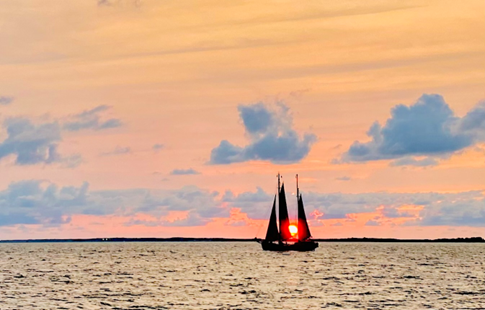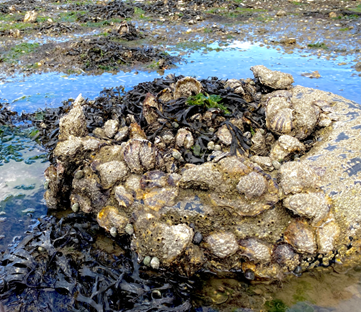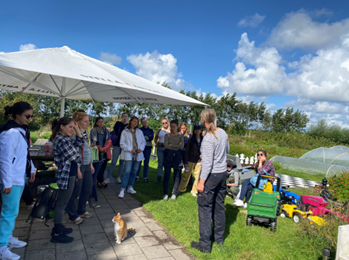A ships log: Summer School 2023 Sustainable Landscapes - The Wadden Experience
Join us for a blog on the adventures of this years summer school, 'Sustainable Landscapes - The Wadden Experience.'
Each year the Wadden Experience takes place in the Northern part of the Netherlands in the World Heritage Wadden Sea Region. The goal is to explore the challenges of steering towards sustainability at the landscape level. During the five day sailing trip, participants will learn from leading experts in the fields of cultural heritage, coastal tourism, landscape stewardship, regional food production, and sustainable entrepreneurship.
Read this years blog below:

Monday August 28
At 10:00 we quickly set sail with the Willem Jacob, a more that 130 year old klipper (https://willemjacob.nl) and we anchored at the south-west side of Ameland. Here we kicked off with a lecture on the ecological system of the Waddensea, and reflected on the long-term impact of the closure dams (Afsluitdijk) on the ecology of the Waddensea. A discussion emerged on the role of people as eco-system engineers, taking responsibility for nature by building artificial reefs instead of not interfering at all.
When the tide was low, we walked at the seafloor, and explored the ecosystem ourselves. In the evening we sailed to the island of Terschelling, where we closed off with a walk and a visit to town.


Tuesday August 29
We started with a breakfast lecture on the history of the area, going back 20.000 years when the sea-level was 150 meter lower. From there we went to more recent times, and discussed the role of human institutions (tribes, monasteries) in developing water management systems (artificial hills, sediment catch and dykes). Following that, we made a cycle tour to see the socio-ecological systems in reality. Interesting discussions emerged on the distinction between culture and nature. And obviously, we had a swim in the warmed up North Sea.
In the evening we set sail for Ameland, and with a soft breeze, a great sunset and some live music on deck we reached Ameland around midnight.

Wednesday August 30
We started with a breakfast lecture on complex systems, demonstrating with simulation models the complex dynamics and tipping points that can occur in socio-ecological systems. Following that we made a cycle tour on the island. We stopped at a field with cows, reflecting on the prices of livestock feed (soy from the Amazon) and how farmers can decide to reduce their milk production and yet make a good profit by switching to different cow breeds that do not require the high-protein and expensive fertilizer demanding grass types that we observed here. Producing island cheese adds to the value farmers can create.
In the evening we had a guest from the island reflecting on the challenges the island of Ameland faces in becoming more sustainable. Many interesting discussions took place later that evening on a terrace in the nearby village.

Thursday August 31
Early in the morning we set sail for Schiermonnikoog (translates as the isle of the grey monks), and we passed some small-scale local fishing boats, and we discussed fisheries and their impact on ecosystems on the Waddensea area. Also, we discussed the impact of windfarms and power-cables on the ecosystem, acknowledging the difficult trade-offs we sometimes have to make.
During lunch we had a lecture on the environmental impact of our diets, resulting in some remarkable outcomes that raised discussion. An analysis of food chains helps in getting a clear perspective on what food sources are best from a sustainability perspective.
Next, we made a long walk on the island, discussing the transition the farmers on Schiermonnikoog are making with respect to downscaling their herds. We had a very interesting visit to the vegetable garden “Tuin naast de Branding”, where Janneke demonstrated how to grow vegetables and involve the local population in becoming aware of the origins of food.
Aboard, we had the opportunity of exploring a series of experiments with computer simulations of socio ecological models. This opened the perspective on how models can help us in developing a better understanding of socio-ecological dynamics and tipping points.
In the evening we had our famous cultural program: visiting the Tox bar. Much dancing took place, and the night was long.


Friday September 1
We all woke up with a final lecture on the latest developments in modelling our own species. Modelling human behaviour is challenging, as it helps in formalizing our own species in socio-ecological models.
Following that we sailed with very calm weather back to Lauwersoog. An interesting lesson was that our speed was that low, that despite we sailed forward, the outgoing tide was stronger, and moved us backward. From a systems view we concluded that focusing on a discipline may reveal some progress, but that a more overarching systemic perspective may reveal that you actually may go backwards.
At 17:00 we closed the summer school. As usual, this was a very inspirational, and at the same very relaxing week. Yet, the intensity of the week was clear, as everybody was satisfied, but also tired.
Next year we plan the next summer school from 26 – 30 August, so if you are interested…

More news
-
15 September 2025
Successful visit to the UG by Rector of Institut Teknologi Bandung

